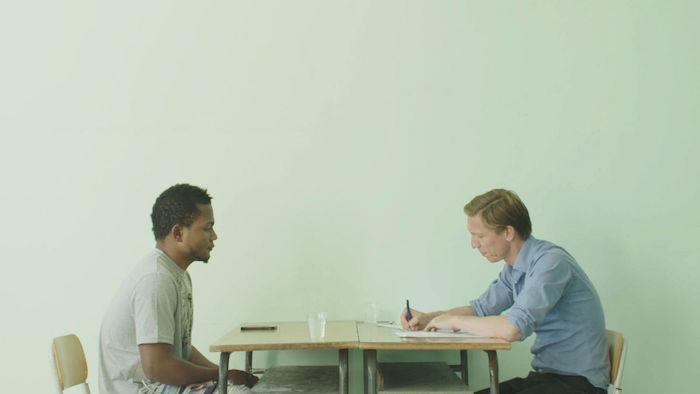
You know that uncomfortable feeling when you’re over at your friend’s house, and their mom starts yelling at them in front of you? You can tell that your friend is feeling rather uncomfortable, and so are you, but you’re not really sure what to do with yourself the whole time. That’s kind of what _Stranger In Paradise_ felt like, except for an hour and 17 minutes and featuring a group of refugees and a European actor in place of your friend and their mom.
Guido Hendrikx’s documentary _Stranger In Paradise_ addresses the European perspective on the ever-present global refugee crisis. Shot in a refugee reception center in a small town in Sicily, Italy, the film presents groups of undocumented refugees who have recently arrived from different areas of the world and sits them down in a small classroom with a European actor. What unfolds is hardly shy of a one-way lecture.
Hendrikx divides the film into several acts, each to represent the different ways in which we, as humans, approach the subject of migration: driven by fear, emotion or genuine lack of emotion.
In Act I, the European actor, Valentijn Dhaenens, lays down the facts on the newly-arrived group. Dhaenens almost takes on the role of Europe as an entirety, reminding the refugees of the considerable monetary cost for taking in each of them, as well as their bleak likelihood of finding consistent work or prosperity.
Dhaenens asks them questions and proceeds to correct every answer they give. The lack of actual conversation is apparent and leaves the viewer feeling slightly uncomfortable for the refugees. A handful of the refugees are resilient in their gumption, but the palpable frustration in most of their eyes fills the small classroom with enough tension to last the whole film.
Act II manages to shed a slightly more optimistic light on the situation, as most of the act is spent discussing the bravery of the refugees and their incentives for their travels. Some are running from war, while some are looking for economic opportunity. Likely purposeful in its irony, however, the act is still almost entirely driven by Dhaenens speaking for the refugees.
The final act brings the focus right back to the emotionless narrative. Dhaenens administers a drawn-out process of labeling the refugees as either victims or threats. Viewers are once more struck with empathy for the refugees.
With Dhaenens cast as a genuine devil’s advocate, “Stranger In Paradise” addresses not only the hopeful aspirations of the refugees, but also the sticky logistics of welcoming them into “the old continent.”
A crisis all too familiar in the U.S., the film is a fresh reminder for viewers all over the world to be self-reflective in the way we look at our fellow humans, especially ones who need our help.
Provocative and uncomfortable, “Stranger In Paradise” purposefully leaves viewers without a “correct” answer, but nonetheless still puts us a step closer to comprehending this humanitarian crisis.
**MOVE gives _Stranger in Paradise_ 4 out of 5 stars.**